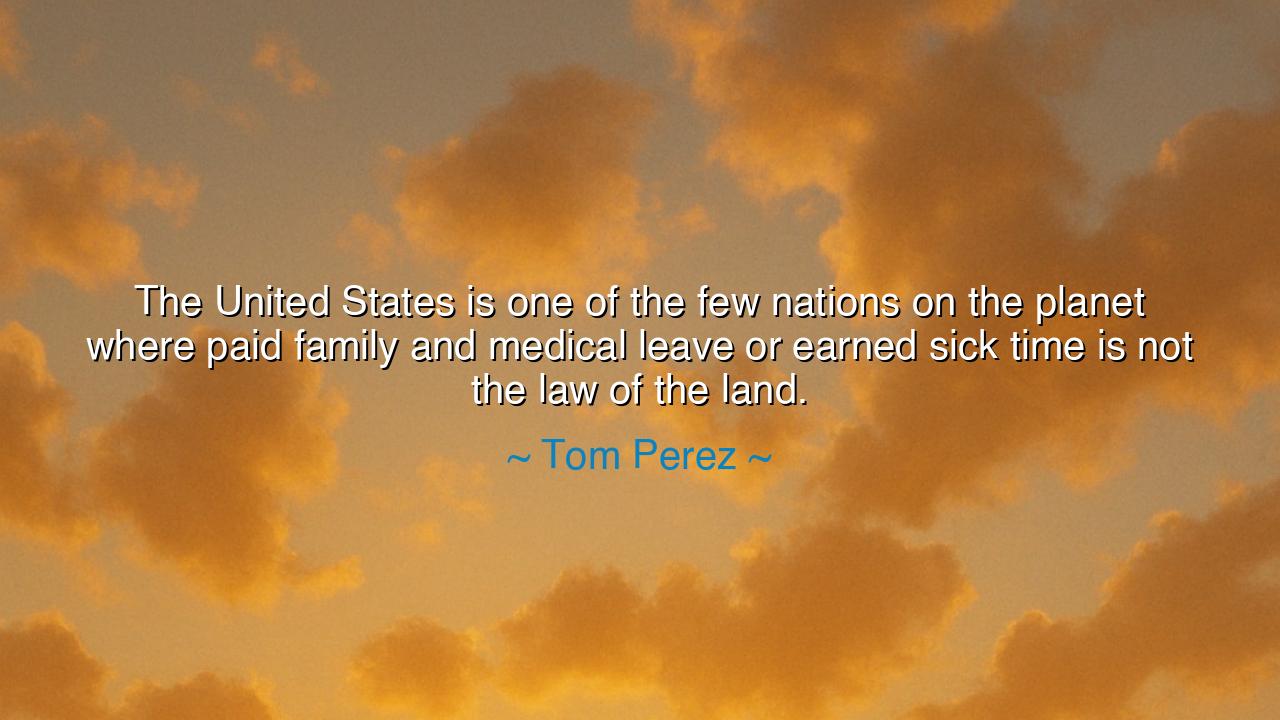
The United States is one of the few nations on the planet where
The United States is one of the few nations on the planet where paid family and medical leave or earned sick time is not the law of the land.






The words of Tom Perez strike with the resonance of justice and compassion: “The United States is one of the few nations on the planet where paid family and medical leave or earned sick time is not the law of the land.” Though spoken in the measured cadence of policy, his statement bears the moral weight of prophecy. It is a lament for what is missing and a summons to what must be restored—the sacred balance between labor and humanity, between toil and tenderness. Within his words lies an ancient truth long known to the wise: that a civilization is judged not by the wealth of its rulers, but by how it cares for its workers when they are weakest—when they are ill, when they bring forth life, when they grieve or heal.
In the old world, the bond between master and servant was replaced by the covenant between worker and state—a covenant built upon the recognition that human beings are not machines of endless labor but souls bound in flesh, in need of rest, of care, of compassion. Perez’s quote reminds us that the United States, though mighty in wealth and innovation, lags behind in this simple but profound mercy. To grant paid family and medical leave is not indulgence—it is acknowledgment of shared humanity. The farmer must rest his oxen; the sailor must mend his sails; and the worker, too, must be allowed to heal without fear of hunger or dismissal. Such is not weakness but wisdom, the wisdom that sustains societies through both triumph and trial.
This absence—the failure to make family and medical leave the law of the land—is not merely a matter of economics but of spirit. It reflects a deeper forgetting: that strength is not measured in productivity alone but in the capacity to nurture. The great nations of the world have learned that the foundation of progress is compassion. In the aftermath of war and ruin, countries such as Sweden, Germany, and Japan rebuilt their societies not only through steel and industry, but through laws that protected mothers, fathers, and the sick. They understood that to honor the dignity of labor, one must honor the fragility of life. To work without rest is to build without foundation; sooner or later, the structure collapses.
Consider, for instance, the story of Frances Perkins, the first woman ever to serve in a U.S. Cabinet, who stood beside President Franklin D. Roosevelt during the Great Depression. Having witnessed the tragedy of the Triangle Shirtwaist Factory fire, where over a hundred workers perished locked inside their workplace, she dedicated her life to enshrining protections for the laboring class. From her courage were born Social Security, the 40-hour workweek, and laws against child labor. Yet even she could not achieve paid medical leave in her time—a dream deferred, left to later generations. Her struggle reminds us that the arc of justice bends not by chance but by the steadfast hands of those who refuse to let mercy die.
In Perez’s lament, one can hear both mourning and hope—the mourning of what is not yet, and the hope that it might yet be. His words call not only to lawmakers but to citizens: to recognize that in denying earned sick time or paid family leave, we deny ourselves the fullness of community. For when a mother must choose between her child’s health and her livelihood, when a father must labor through fever, when a nurse or teacher must serve others while unhealed themselves, the wound does not belong to the individual alone—it belongs to the nation. A society that fails to care for its caregivers invites decay from within.
And yet, there is a path forward. The same spirit that built railways across mountains, that fought tyranny across oceans, that marched for civil rights through tear gas and night—this same spirit can forge laws that honor the dignity of work and the sanctity of care. The ancients taught that justice is the soul of the state; when it weakens, the whole body grows ill. To make paid leave a birthright, not a privilege, is to heal a nation’s heart. It is to proclaim that compassion is not charity—it is duty.
So, my child of labor and light, take this lesson deeply: a society cannot flourish when it demands strength but offers no sanctuary. Let your voice, your vote, your compassion be instruments of change. Stand for those who cannot stand for themselves; speak for those too weary to speak. For as Tom Perez’s words remind us, greatness lies not in power but in empathy, not in production but in protection. The law of the land must be written not only on paper, but in the conscience of every citizen: that to care for one another is the highest form of patriotism.
For in the end, when the fires of time burn away all monuments and wealth, only the legacy of kindness remains. The measure of a nation is not how high its towers rise, but how gently it lifts the fallen. And when that day comes—when the United States joins the ranks of those who enshrine family, healing, and human dignity into law—it will not merely have passed legislation. It will have remembered its soul.






AAdministratorAdministrator
Welcome, honored guests. Please leave a comment, we will respond soon